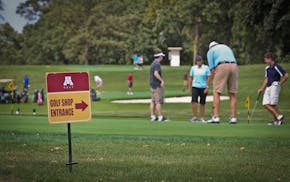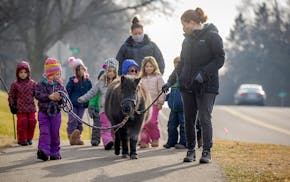Natalie Rath is eager to start a new year at the University of Minnesota and build support for the movement urging people to divest from Israel.
Halle Wasserman, a Jewish student, is "going in with a little unease. I know the school year can be unpredictable, especially with this upcoming election."
The spring semester ended on a tense note. Protests reinvigorated old debates about the lines between free speech and making sure all students feel safe on campus. Reports of antisemitism and Islamophobia rose at colleges across the country, and the U.S. Department of Education opened more than 100 investigations into allegations of discrimination after the war began.
Leaders at colleges across the country spent the summer months trying to figure out how they can best prepare students to navigate polarizing political issues, including the war between Israel and Hamas and the looming November elections.
"That's certainly something that I think is on every college president's mind at the moment," said Alison Byerly, president at Carleton College in Northfield. "We certainly have thought about what went well and what was more challenging last year."
Presidents at some schools, including Columbia University, resigned after facing criticism for their handling of pro-Palestinian encampments. Leaders at others, including the U, were called before lawmakers to face questions about whether they'd done enough to protect students from antisemitism.
And college administrators expect their responses this fall will face similar scrutiny because of their roles as educators.
"I think our students are not alone in having strong feelings about events that I think we all find distressing," Byerly said. "To me, one of the benefits of being on a college campus is that we do have the capacity to create opportunities for information to be shared, for dialogue to occur."
Caption: Halle Wasserman, center, addresses the media reacting to the deal the University of Minnesota made to end a pro-Palestinian encampment on the Twin Cities campus this spring.
Setting expectations for the year
When tensions rose, Byerly invited a small group of student leaders to her house to talk about the conflict and how they felt after hearing certain words or phrases. Over the summer, Carleton College wrapped up disciplinary proceedings for a small number of students who temporarily occupied a building on campus. For the fall, campus leaders are planning events aimed at explaining how local politics affect students and how they can ensure their votes matter.
New U President Rebecca Cunningham, who took over this summer, reviewed the school's policies on academic freedom, protests and other related issues.
"I did not come in and change any of our University of Minnesota policies," Cunningham said. But she did ask U staff to create new documents summarizing them so students have a clearer way to quickly discern what types of protests are allowed and what kinds of consequences they might face if they violate them.
Protests will be allowed in the U's outdoor plazas but must be limited to 100 people and wrap by 10 p.m. Tents are prohibited. Participants can't interfere with "classes, research, work, or other University operations," and U employees won't be allowed to participate during their work hours.
The effort to clarify policies was welcomed by Janie Mayeron, chair of the U's Board of Regents, who convened a special meeting last week in part to ensure that students had the information they "needed to know the rules of the road before they got here."
Navigating these issues has been tough, she said.
"On the one hand we are so committed to freedom of expression and academic freedom, and at the same time we do have other policies that are equally important to us: diversity, inclusion, belonging," Mayeron said. "This is a perfect example of where we're seeing all of those policies at play that are all important to us."
Navigating tensions
Participating in the encampment at the U last spring was a "very powerful, very interesting experience," said Rath, a member of Students for a Democratic Society, one of the groups that called for university leaders to divest from companies with ties to Israel and U.S.-based defense contractors.
Rath forged tight bonds with fellow protesters while working late into the night on encampment security and learned how to organize people during a "very elevated time of political pressures."
She expects to see resistance from some campus leaders — regents on Tuesday rejected their divestment requests — but also sees the potential to mobilize more people to support their cause.
"Admin is not going to be with us. They're always going to be against us. They're going to try to stop something like an encampment from happening again," Rath said. But, she added, "We are going to continue to protest and do all that we can and all that we need to do."
Wasserman, vice president of Jewish student organization Chabad, met with some campus leaders over the summer and described them as kind and well-intentioned. But she wants to see more from them, including a more concrete plan for ensuring that Jewish students feel safe on campus and stronger statements denouncing antisemitism.
The end of the spring semester was hard, she said, adding that she heard antisemitic remarks while walking around campus. She said some students felt pressured to conform to professors' political views in classes. She didn't feel comfortable wearing the Jewish star on her necklace.
"I really hope that campus is a place where I do feel comfortable wearing and presenting my Jewish identity," she said. "That's never something that I should have to hide or never something that any other Jewish student should have to hide."

Thompson found guilty of murder in car crash that killed 5 young women

University of Minnesota is putting its golf course up for sale
Supreme Court allows DOGE team to access Social Security systems with data on millions of Americans
Feeding Our Future probe: Apple Valley woman charged with defrauding food program of $1.4 million

